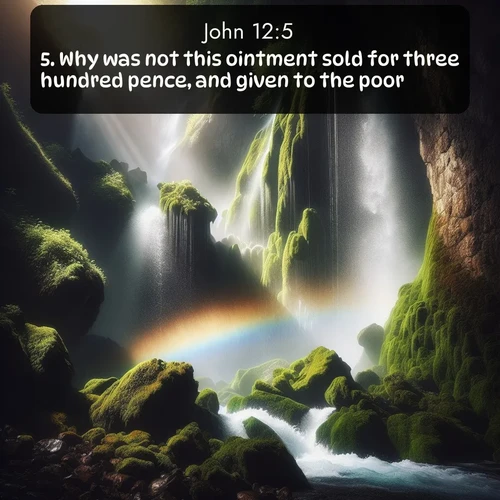Gospel of John 12:5 plusieurs versions / traductions
English Bible Translations
5. Why was not this ointment sold for three hundred shillings, and given to the poor?
5. Why was not this perfume traded for three hundred pence, and the money given to the poor?
5. Why was this ointment not sold for three hundred denarii and given to the poor?
5. Why was not this ointment sold for three hundred pence, and given to the poor?
5. `Wherefore was not this ointment sold for three hundred denaries, and given to the poor?'
German Bible Translations
5. Warum ist diese Salbe nicht verkauft um dreihundert Groschen und den Armen gegeben?
5. Warum hat man diese Salbe nicht für dreihundert Denare verkauft und es den Armen gegeben?
French Bible Translations
5. «Pourquoi n'a-t-on pas vendu ce parfum 300 pièces d'argent pour les donner aux pauvres?»
5. Pourquoi n’a-t-on pas vendu ce parfum trois cents deniers, pour les donner aux pauvres?
5. Pourquoi n'a-t-on pas vendu ce parfum trois cents deniers, pour les donner aux pauvres?
5. Pourquoi ce parfum n'a-t-il pas été vendu trois cents deniers et donné aux pauvres?
5. Pourquoi ce parfum n'a-t-il pas été vendu trois cents deniers, et [cet argent] donné aux pauvres?
5. Pourquoi n'a-t-on pas vendu ce parfum trois cents deniers, pour les donner aux pauvres?
Versions with Strong Codes
John 12 / KJV_Strong5. Why[G1302] was not[G3756] this[G5124] ointment[G3464] sold[G4097] for three hundred[G5145] pence,[G1220] and[G2532] given[G1325] to the poor?[G4434]
Strong Code definitions
G1302 diati/dee-at-ee' from G1223 and 5101; through what cause ?, i.e. why?:--wherefore, why. see G1223 see G5101
G3756 ou/oo, also (before a vowel ouch ookh a primary word; the absolute negative (compare 3361) adverb; no or not:--+ long, nay, neither, never, no (X man), none, (can-)not, + nothing, + special, un(-worthy), when, + without, + yet but. See also 3364, 3372. see G3361 see G3364 see G3372
G5124 touto/too'-to neuter singular nominative or accusative case of G3778; that thing:-here (-unto), it, partly, self(-same), so, that (intent), the same, there(-fore, -unto), this, thus, where(fore). see G3778
G3464 muron/moo'-ron probably of foreign origin (compare 4753, 4666); "myrrh", i.e. (by implication) perfumed oil:--ointment. see H4753 see G4666
G4097 piprasko/pip-ras'-ko, a redup 4097] (piprasko/pip-ras'-ko, a reduplicated and prolonged form of) certain tenses) contracted from perao (to traverse; from the base of G4008); to traffic (by travelling), i.e. dispose of as merchandise or into slavery (literally or figuratively):--sell. see G4008
G5145 triakosioi/tree-ak-os'-ee-oy plural from G5140 and 1540; three hundred:--three hundred. see G5140 see G1540
G1220 denarion/day-nar'-ee-on of Latin origin; a denarius (or ten asses):--pence, penny(worth).
G2532 kai/kahee apparently, a primary particle, having a copulative and sometimes also a cumulative force; and, also, even, so then, too, etc.; often used in connection (or composition) with other particles or small words:--and, also, both, but, even, for, if, or, so, that, then, therefore, when, yet.
G1325 didomi/did'-o-mee a prolonged form of a primary verb (which is used as an alternative in most of the tenses); to give (used in a very wide application, properly, or by implication, literally or figuratively; greatly modified by the connection):-adventure, bestow, bring forth, commit, deliver (up), give, grant, hinder, make, minister, number, offer, have power, put, receive, set, shew, smite (+ with the hand), strike (+ with the palm of the hand), suffer, take, utter, yield.
G4434 ptochos/pto-khos' from ptosso (to crouch); akin to G4422 and the alternate of G4098); a beggar (as cringing), i.e. pauper (strictly denoting absolute or public mendicancy, although also used in a qualified or relative sense; whereas G3993 properly means only straitened circumstances in private), literally (often as noun) or figuratively (distressed):--beggar(-ly), poor. see G4422 see G4098 see G3993
Prédications qui analysent les thèmes Évangile selon Jean 12
Thèmes : L'amour parfait; La prière de JésusRelated Sermons discussing Gospel of John 12
Themes : L'amour parfait; La prière de Jésussee also: Bible Key Verses ; KJV Bible Images, BBE Bible images

